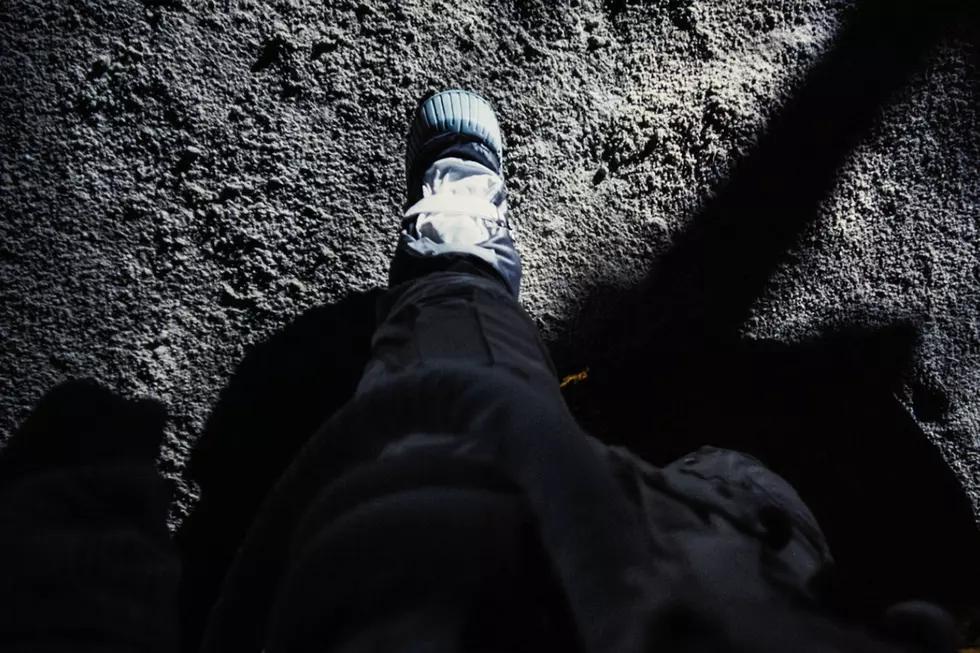
‘First Man’: Did Neil Armstrong Really Leave His Daughter’s Bracelet on the Moon?
The following post contains SPOILERS for First Man. Normally, I would say that spoilers in a movie about one of the most famous events in human history are not possible, but in this case, I’ll make an exception.
There are two stories in First Man, Damien Chazelle’s new film about Neil Armstrong and his journey to the Moon. The first is the one you know; Armstrong’s early days in NASA, his training, Gemini 8, Apollo 11, and becoming the first man to set foot on the lunar surface. The second story is the one you don’t know; Armstrong’s home life, much of it deeply unhappy following the death of his two-year-old daughter Karen.
When Karen passes away in 1962, Neil (Ryan Gosling) is devastated. He locks her little bracelet away in a drawer, and seems to lock away a piece of his soul with it. He grows distant from his wife Janet (Claire Foy). He struggles to connect with his remaining children, and he throws himself into his work. He remains singularly focused on NASA, even as his good friends and fellow astronauts die during the dangerous missions.
The two stories merge during First Man’s remarkable final scenes on the surface of the Moon. The Eagle lunar lander touches down, Armstrong steps out, and gives his famous speech about one small step. Then, he walks away from Buzz Aldrin (Corey Stoll) for a moment. At the edge of a crater, he reveals the secret cargo he’s snuck onto Apollo 11: Karen’s bracelet. He drops it into the crater and returns to his work.
It’s an incredibly powerful moment — and one that feels too perfect to be real. Did Chazelle just make it up to give his movie a more complete and satisfying emotional arc? The answer is surprisingly complicated.
Armstrong really did venture off alone for a private moment at the Little West Crater during his time on the Moon. We don’t know what Armstrong did there — but we do know it was the only moment of the Apollo 11 crew’s time on the Moon that wasn’t part of the mission, which was otherwise carefully planned out.
“Everything else that they did on the Moon was scripted,” First Man screenwriter Josh Singer told me during a recent interview. “[Armstrong] jogging over to the Little West Crater, that was Neil going ‘I’m going to go over here.’ Why does he do that? What's he do over there?”
What happens next in the film wasn’t Chazelle’s or Singer’s idea — it’s taken from the authorized biography First Man is based on, First Man: The Life of Neil A. Armstrong by James R. Hansen. It was Hansen who first speculated that Armstrong may have left something of Karen’s behind on the Moon.
And while it is speculation, the moment is informed by real events. NASA astronauts who went to the Moon often left mementos behind. Singer points out that Armstrong and Aldrin also placed an Apollo 1 mission patch to honor the sacrifices of their fallen comrades. Years later, Apollo 16 astronaut Charlie Duke left a photo of his family on the Moon. In addition, Hansen asked Armstrong’s sister June if she thought he brought something of Karen’s with him on Apollo 11 and perhaps even left it there. Her response, according to Singer, was “I dearly hope so.”
Singer claims he would “never have made that choice” to show Armstrong dropping the bracelet on his own. (“That’s Hollywood!” he told me.) “But,” he explained, “if Jim [Hansen], who studied Neil for years and talked to Neil for hours and hours, and talked to Janet and June and everyone in his family. If he ... based on what he knew of Neil after all that time and based on all his interviews with everyone else said ‘I think I this happened. I think he left something of Karen's on the moon’ ... I was like ‘All right, if it's good enough for Jim, it's good enough for me.’”
So there you have it: First Man’s bracelet scene is a mixture of fact, educated guesswork, and fiction. Is it possible Armstrong brought a remembrance of his daughter with him to the Moon and left it there? It’s possible. Did he definitely do it? We don’t know — and since Armstrong passed away in 2012, we won’t know for sure until we go back to the Moon, something that hasn’t happened since 1972. But as First Man quite eloquently argues, maybe it’s time for us to return there.
Gallery — The Best Sci-Fi Movie Posters of All Time:




